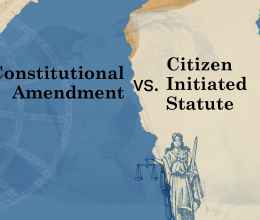A Butler County Sheriff’s Deputy secretly attached a GPS-tracking device to Mr. Johnson’s vehicle while it was parked on the street across from Johnson’s home. The officer did not have a warrant or contact a judge to seek authorization. The sheriff’s department suspected Johnson of drug trafficking and decided to use the GPS tracking device after concluding that round-the-clock visual surveillance was impractical. The deputies tracked Johnson’s van for six days as it traveled through at least three states. Their tracking came to an end at a “traffic stop” conducted at gunpoint by over a dozen sheriff deputies and state police officers. No contraband was found in Johnson’s vehicle, but contraband was found in his associate’s vehicle which had also been stopped.
Legal Theory
It is a violation of an individual’s Fourth Amendment rights for law enforcement to secretly attach a GPS-tracking device without a warrant. Courts across the country are divided on this issue, and this is a case of first impression in the Ohio Supreme Court.
Status Update
Johnson was arrested and charged. Prior to trial, Johnson filed a motion to suppress all evidence obtained or resulting from the warrantless GPS tracking. The trial court overruled the motion. Johnson entered a plea of “no contest” and appealed his conviction. The Twelfth District Court of Appeals affirmed Johnson’s conviction. Johnson asked the Ohio Supreme Court to hear his appeal, and the Court accepted the case.
Johnson’s appeal brief was filed June 3, 2011. We signed onto an amicus brief in support of Johnson’s Fourth Amendment claim that was filed on June 6, 2011. The amicus brief was prepared by the National Association of Criminal Defense Lawyers and joined by the Ohio Association of Criminal Defense Lawyers, Electronic Frontier Foundation, First Amendment Lawyers Association, Center for Democracy and Technology, ACLU of Ohio, Ohio Public Defender, and seven law professors. The state’s appeal brief was filed July 1, 2011. On September 8, 2011, counsel for Johnson filed a notice that the U.S. Supreme Court had accepted U.S. v. Jones, a case raising the same question about the legality of warrantless GPS tracking by law enforcement. The Ohio Supreme Court held oral argument for the case on October 19, 2011.The U.S. Supreme Court decided United States v. Jones on January 23, 2012, holding that attaching a tracking device to an automobile does constitute a Fourth Amendment search. The Ohio Supreme Court has since vacated and remanded Johnson’s case to the Twelfth District Appellate Court, Butler County, for application of the Jones decision, which reversed its previous decision and sent the case back to the trial court.
On October 19, 2012, the trial court issued a decision again denying Johnson’s motion to suppress. A month later, counsel for Johnson filed an appeal to the Twelfth District Court of Appeals. On November 4, 2013, the Twelfth District Court of Appeals filed its decision affirming the lower court’s denial of Johnson’s motion to suppress. The Court reasoned that suppressing the evidence against Johnson would have little deterrent effect upon unlawful conduct by law enforcement and that law enforcement acted with an objectively reasonable good faith belief that their conduct was lawful.On December 16, 2013, Johnson appealed to the Ohio Supreme Court, which granted the appeal on March 12, 2014.
On May 6, 2014, Johnson filed his merit brief, and the State filed its merit brief on June 19, 2014. Oral argument were held on September 24, 2014.
On November 13, 2014, the Supreme Court of Ohio handed down its decision. The Court found that the officers who placed the GPS device on Johnson’s car without a warrant acted reasonably and in good faith in believing their actions were lawful. Therefore, the Court held that the evidence the officers obtained from the GPS device was admissible.







